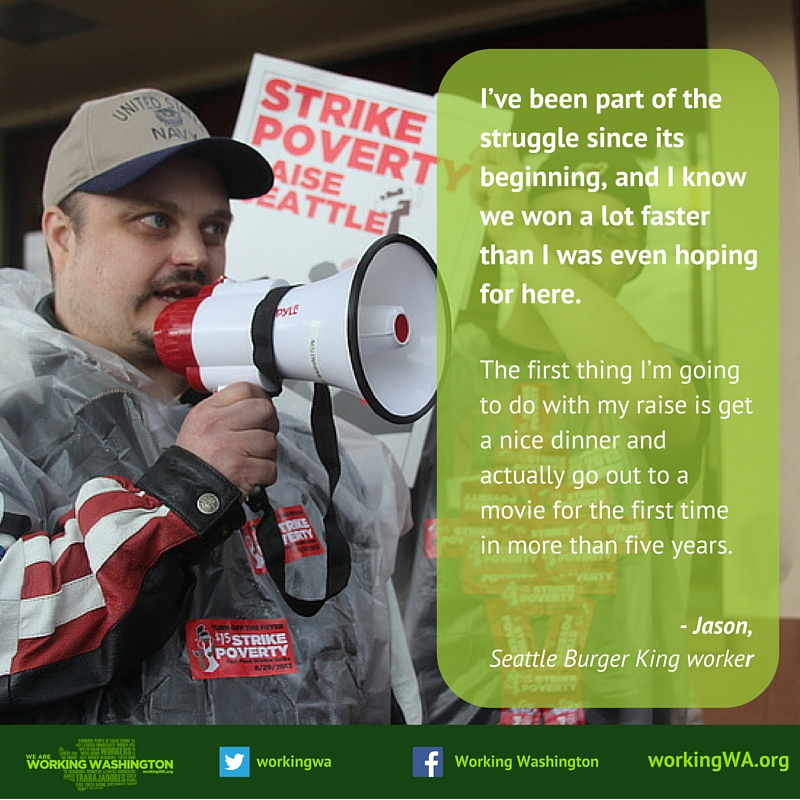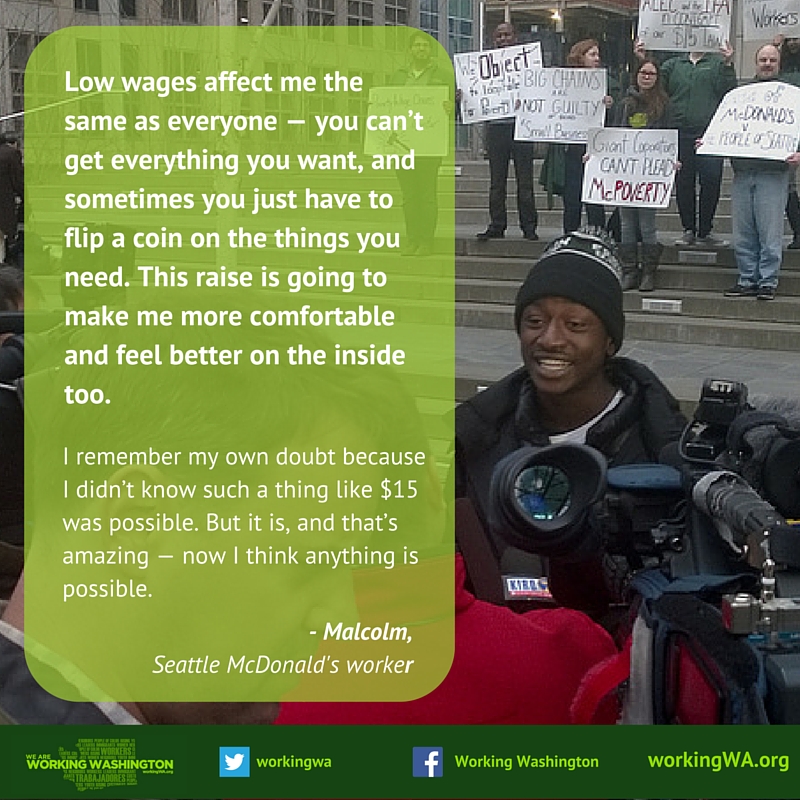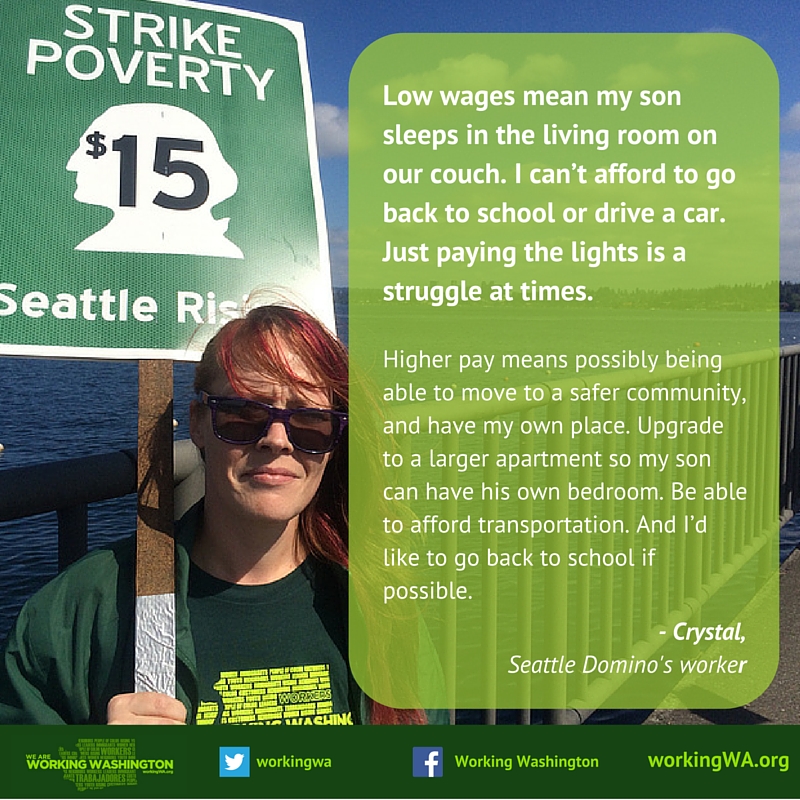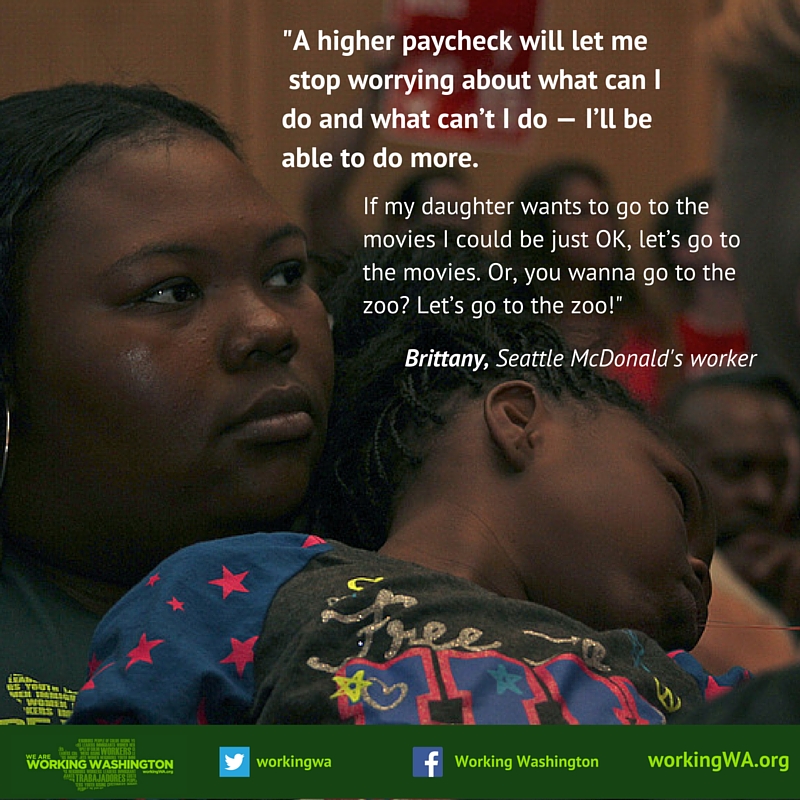Statewide minimum stuck at paltry $9.47/hour for second straight year; will no longer be nation's highest
Seattle's march to a citywide $15 minimum wage takes another leap forward on January 1, 2016, when the city's minimum wage rises to $13/hour for many workers. Meanwhile, the rest of the state will not see an increase at all, as the statewide minimum remains stuck at just $9.47/hour for another year — substantially less than it takes to afford a 1-bedroom apartment in Bellingham, Bremerton, Lewiston, Longview, Tacoma, the Tri-Cities, Wenatchee, Yakima, or just about anywhere else in the state.
Despite predictions of disaster, Seattle's economy continues to boom with its nation-leading minimum wage. In fact, the city's unemployment rate is among the lowest around, and new restaurants are opening at a torrid pace — including many opened by the very same people who said a higher minimum wage would cause the sky to fall.
For years Washington State has enjoyed the economic benefits of having the nation's highest statewide minimum wage. As of January 1st, our state loses that title: while Washington's minimum will be $9.47/hour for another year, the statewide minimum wage in Massachusetts & California will rise to $10/hour and Alaska's minimum will increase to $9.75/hour.
WhatsMyWage.org helps Seattle workers navigate this year's wage
Seattle's landmark $15 minimum wage law phases in over several years in a way that ensures every low-wage worker gets a substantial wage increase each year, allows smaller independent businesses more time to see the benefits of increased consumer demand, and gets every worker to a true, universal, citywide, inflation-adjusted $15 minimum wage.
Effective January 1, 2016, Seattle's minimum wage increases as follows:
- $13 an hour if you work at McDonald's, Target or another large company or chain with more than 500 employees nationally, and you do not receive healthcare benefits from your employer.
- $12.50 an hour if you work at Starbucks, Tom Douglas Restaurants or another large company or chain with more than 500 employees nationally, and do receive healthcare benefits from your employer.
- $12.00 an hour if you work at a smaller company or chain with less than 500 employees nationally and do not receive tips or healthcare benefits from your employer.
- $10.50 an hour in wages and at least $12.00 an hour in minimum compensation if you work at a smaller company or chain with less than 500 employees nationally. Your minimum compensation is the sum of your wage, your tips, and the cost to your employer of providing healthcare benefits. You can't be paid less than $10.50 in wages, regardless of the amount of your tips or benefits.
Our Whats My Wage tool — developed with Code for Seattle volunteers — can help workers navigate the law and report violations. Visit whatsmywage.org for more information.
Minimum wage remains at $9.47 across Washington State
Washington State's minimum wage is supposed to increase with inflation, but the Consumer Price Index showed no increase over the past year, so the statewide minimum wage will remain at $9.47/hour for a second straight year. However, many workers are seeing rent and other basic expenses rise rapidly. According to [a study by the National Low-Income Housing Alliance, the minimum wage is far less than is necessary for a full-time worker to afford a one-bedroom apartment in our state:
Hourly wage necessary for full-time worker to afford a 1-bedroom apartment*
Bellingham: $13.87/hour
Bremerton-Silverdale: $14.96/hour
Kennewick-Pasco-Richland: $12.46/hour
Lewiston: $10.35/hour
Longview: $11.52/hour
Mount Vernon-Anacortes: $14.13/hour
Olympia: $16.12/hour
Portland-Vancouver-Beaverton: $15.25/hour
Seattle-Bellevue: $22.12/hour
Spokane: $10.98/hour
Tacoma: $16.13/hour
Wenatchee-East Wenatchee: $10.83/hour
Yakima: $11.48/hour
STATEWIDE MINIMUM WAGE: $9.47/hour
* Data from National Low Income Housing Coalition's Out of Reach 2015 study.





